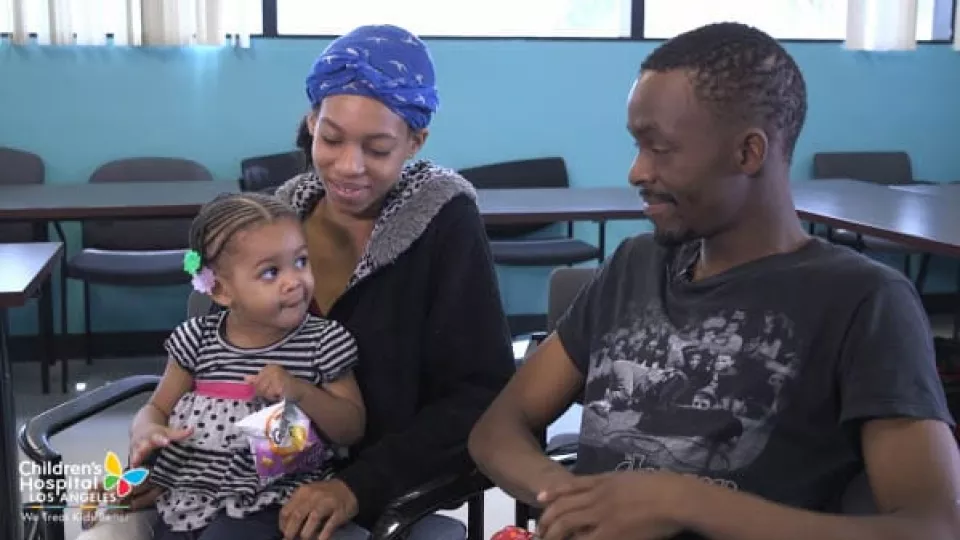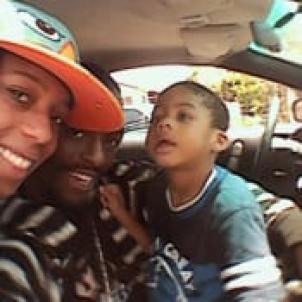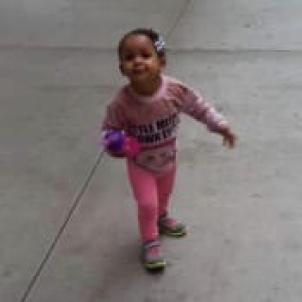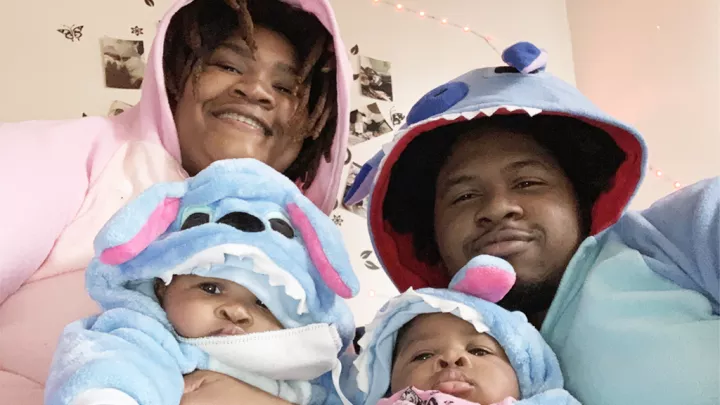
Stephanie Williams: A Journey from Overwhelmed to Motivated
When Stephanie Williams started her classes at Second Chance High School at Children's Hospital Los Angeles, she was a scared 19-year-old mom. She had been out of school for more than a year and was struggling to find her way. The school and especially her teacher, Sally Bird, became her safe haven.

Stephanie was able to find Second Chance thanks to CHLA’s Project NATEEN, a teen pregnancy case management program in the Division of Adolescent and Young Adult Medicine. Project NATEEN, which is celebrating its 30th year in service, offers caseworker support, housing assistance, health care services, a food bank and a teen parent academy to teach parenting skills, job readiness and self-sufficiency skills such as financial literacy.
In collaboration with the Los Angeles County Office of Education, Project NATEEN also provides the highly successful on-site independent study high school, where Stephanie began to thrive. Each student works one on one with a teacher to complete the credits they need to receive a high school diploma.
“I was feeling very overwhelmed when I first came to Project NATEEN,” says Stephanie, who was referred to the program through the Department of Social Services. “Everyone in the program is so nice and caring. They helped me keep positive.”
For Stephanie, who first became a teen mom at age 17, the school provided the support and guidance she needed to continue her education. She will receive her high school diploma in June and is planning to enroll at Los Angeles Community College with hopes of pursuing a degree in engineering at a four-year university.
“Stephanie’s perseverance has been amazing,” says Bird, who has been teaching for 40 years. “It has been a pleasure getting to know her.”

Creating hope
Stephanie had dropped out of her public school in Long Beach at the beginning of 10th grade and tried another independent study program without much success. “I was being bullied at school; I didn’t feel comfortable there,” she says. “I just didn’t feel motivated to continue.”
For many teen moms like Stephanie, the lack of support system and a stable home life can create chaos and feelings of hopelessness. Before finding Project NATEEN, Stephanie, who has three kids ranging in age from 8 months to 3 years, had to cope with a lack of support from her family, a custody battle and having no place to live.
Teen moms are referred to Project NATEEN by county social service programs; schools; Women, Infants and Children (WIC) programs; or friends. A case manager works one-on-one with each young mom (or dad) to determine the best services, ranging from finding appropriate medical care to ensuring access to basic essentials like food, diapers and a safe place to live. As part of CHLA's Division of Adolescent and Young Adult Medicine, case managers can refer teens to many of the hospital’s own services, including medical clinics, substance abuse services and mental health counseling. For homeless teens, the Division has specific services to find housing.
“The case manager develops a relationship with the new mom or dad, and in the course of working together, the teen will disclose other things that are going on such as domestic abuse or substance abuse,” says Carla Hill, MPA, Project NATEEN program manager. “We can deal with that as well.”
Through Project NATEEN, Stephanie began rebuilding her life. “The case managers gave me a better outlook on life,” she says. “They helped me set goals, find a place to live and stay on track with school. Going back to school was one of my main goals and they helped me figure out how to do it.”
Nurturing an open mind-set
At Second Chance, Stephanie formed a special bond with Bird, who helped her improve her focus on homework and school projects and sharpen her writing skills, and more importantly, gave her the courage to dream about a better future.
Bird recalls a writing project where she asked her students to discuss one thing they would change about their life. That writing prompt gave Stephanie a voice she didn’t know she had. She reached deep inside and allowed herself to express her feelings with candor and authenticity.
“This was the first time that I shared about my childhood and all the things that happened to me,” says Stephanie. “This was inside of me for so long and it was a huge release to tell somebody. Because I felt so close to my teacher, I felt like I could open up about my life.”
Often times, writing can be a powerful tool for expression and self-awareness, and for Stephanie it became the bridge to healing and growing. “It’s not easy to allow yourself to be vulnerable like that,” says Bird. “But Stephanie was able to open up and share what scared her. I so appreciate her open mind-set. This is what has allowed her to be successful in this program.”

Consistency, stability and encouragement
One of the greatest benefits of Project NATEEN is its mission to bring caring adults into the lives of young teens who might have never experienced a stable, loving home life.
“For many of our students, this is the first time that they are experiencing that feeling of consistency, stability and someone holding them to high expectations and praising their hard work and effort,” says Bird.
The transformation that the teens go through by having a much-needed support system is what inspires the Project NATEEN team every day. “Teens have so much they can do with just the right intervention,” says Hill, who's been with the program for 20 years. “Sometimes the intervention is just a smile and 'Hello.' If you treat teens in a non-judgmental way, you can really see the changes.”
Project NATEEN has helped to contribute to a dramatic decrease in rates of teen pregnancy over the last two decades. Between 1991 and 2014, the teen birth rate declined by 61 percent nationwide. Overall, the teen birth rate in California also dropped—to a record low of 21.1 births per every 1,000 females 15-19 years of age. According to Hill, the decrease is a result of many factors, including the increased use of long-acting, reversible contraceptives such as intrauterine devices (IUDs) and implants, culturally and age-appropriate sex education programs that are not based solely on abstinence, and the state’s focus on better access to health care.
This past year and a half has made a huge difference in Stephanie’s life. She has a comfortable home, is looking for a part-time job and is excited to start her college classes. And, of course, there is her high school graduation ceremony, held at the Disney Concert Hall. “This was a big goal for me to accomplish,” she says. “I’m feeling really proud.”
Learn more about Project NATEEN.


